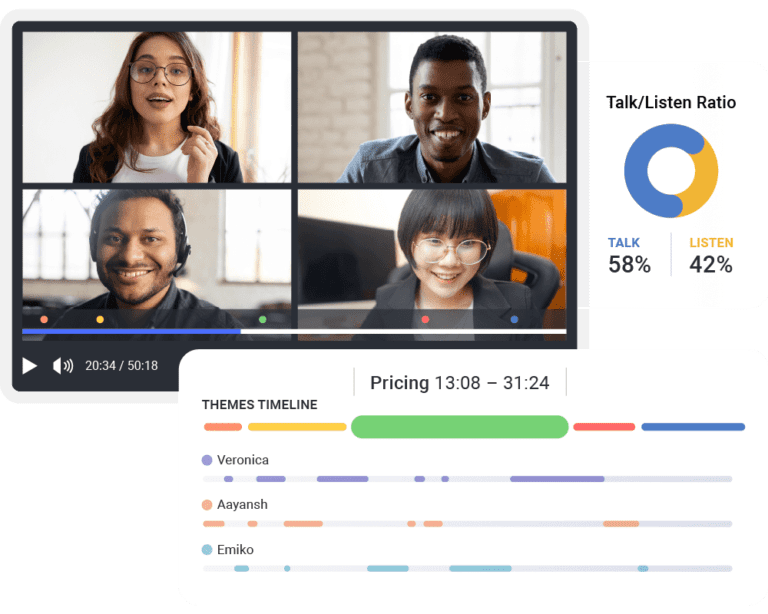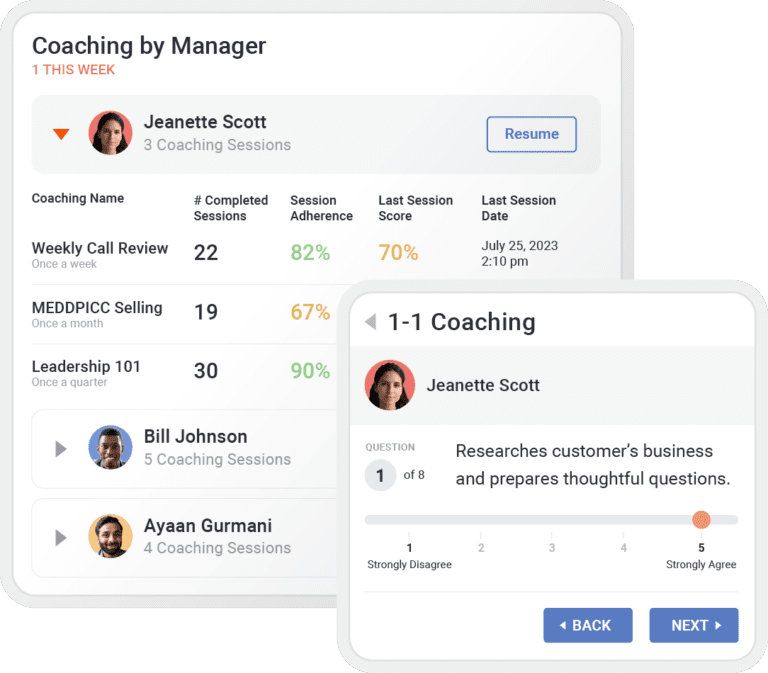Sales training and coaching are often reserved for new hires and low performers. For the rest of the team, training may be limited to a brief refresher during the annual sales kickoff.
But this approach to sales training isn’t as effective as we’d like to think. In many cases, this is because revenue organizations only cover a few training topics with their sales professionals.
To improve the effectiveness of training (and your entire sales enablement program), you must continually cover a full range of sales training topics. This will help all your reps build the skills and knowledge required for any selling scenario.
Sales training topics
- Pipeline management
- Prospecting and outreach
- Qualifying leads
- Call planning
- Building relationships with customers
- Identifying customer needs
- Presenting the value of your products
- Competitor knowledge
- Managing objections
- Closing deals
1. Pipeline management
Your sales reps need to be able to build their pipeline, prioritize leads and prospects based on lead quality and sales urgency, and measure their results.
In fact, research suggests that effective pipeline management is closely linked to rep performance.
However, a recent survey found that generating and converting a healthy pipeline is a top challenge among revenue professionals.
Training in pipeline management can set junior team members up for success. They’ll be able to keep track of all their deals in your CRM, know what pipeline stage their deals are at, and determine whether they have enough conversations in progress to hit quota.
2. Prospecting and outreach
Sales prospecting and outreach are two competencies that go hand in hand. Business development reps (BDRs) need to find and identify good-fit potential customers and then craft compelling messages to engage them. According to a Salesforce report, sellers spend about 17% of their time each week prospecting and researching potential customers to ensure they fit your ideal customer profile (ICP).
Sellers spend about
Top performers spend even more time researching their prospects. According to a LinkedIn report, 82% of top performers say they always perform research prior to reaching out to prospects, compared to 49% of other sellers.
Cold calling and outreach emails are essential skills for BDRs to master if they want to bring new prospects into their pipeline. You can provide training and coaching via verbal and written role-plays to help reps practice these core skills. In fact, we found that learning to prepare cold email intros is the top use case for written role-plays by BDRs in the Mindtickle platform.
3. Qualifying leads
Nurturing or repeatedly contacting bad-fit leads is a waste of your reps’ time and energy. Furthermore, following up with a prospect they know isn’t interested is one of the top frustrations reps have with their jobs. And if a lead is a bad fit, they’re more likely to book time with your reps but never show up.
One way to cover this in sales training and revenue enablement is to share bite-size quizzes to test reps’ ability to qualify leads and their familiarity with your ICP. Then, if you identify knowledge gaps that may be affecting their lead qualification capabilities, you can follow up with AI-driven coaching.
4. Call planning
Your sellers need to know how best to prepare and plan for a call with a prospect at every stage of the sales cycle. For initial calls, sellers need to make a good first impression. They must build rapport with prospects and become trusted advisors for later calls.
Oracle found that 11% of prospects ignore sellers because the seller wasn’t properly prepared for their conversation. Call planning is essential for all sellers.
You can create training materials such as pre-call checklists or run practice calls for product demos, discovery calls, or closing calls. These will allow your sellers to appear professional, knowledgeable, and trustworthy to prospects.
5. Building relationships with customers
Relationship building is another essential skill because, even in B2B sales, you’re still dealing with another person. According to research from Forrester, trust is the most important factor contributing to whether or not a company will do business with you. So it’s essential that your reps get training and coaching to help them foster relationships and earn prospects’ trust.

Use tools like Mindtickle’s Call AI to record and analyze calls with prospects. It looks at reps’ confidence, talk time, clarity, and sentiment to understand their behavior on calls. It then identifies areas to improve. You can use these insights as a starting point for your coaching sessions or share dedicated training exercises to help them further develop the necessary skills.

6. Identifying customer needs
Research tells us nearly nine in ten B2B buyers are more likely to purchase if the seller understands their goals. Yet, nearly 60% of these buyers say most sales reps don’t take the time to understand their needs and goals.This is an immediate deal killer.
Sellers need to be able to identify customers’ pain points so they can show how your product will solve them. If they can identify customer challenges and needs, they can tailor the conversation to address those challenges and focus on the features and use cases that are most relevant to the customer.
You can listen back to call recordings or view call analyses, then score reps based on their ability to identify customer needs. If reps struggle with this, you can run training exercises such as practice calls or role-plays to give them more opportunities to develop their abilities in a low-pressure setting. Manager-led coaching helps provide personalized coaching to all your sellers, targeted to their individual needs.

7. Presenting the value of your products
Sellers not understanding their product or service is another deal killer for many buyers. Your reps need to be able to provide effective demos that illustrate how your products will save buyers time, money, or effort. They need to be able to show the value of your product and not just run through a list of features.
You can provide different training formats for this:
- Short quizzes to test product knowledge
- Practice demos and virtual role-plays
- Dedicated training sessions from your product team when you roll out new features
Product training will help your reps learn how to use your product and ensure they can accurately present its value to potential customers.
8. Competitor knowledge
Prospects will not just speak to your sales team but also compare different product options. A recent survey found that 57% of sales leaders feel competition has increased since last year.
You need to be able to show how you measure up against your competitors. Familiarity with other products in your space is essential knowledge for sales reps, as not understanding competitors’ products and services may make buyers less likely to continue with a specific seller.
Train your reps on your competitors’ products by creating battle cards or in-depth instructor-led training sessions to review the key differences and where your product excels against the competition. Then, test reps’ knowledge with quizzes that review the training session’s material. Spaced reinforcement helps improve information retention, so your reps can speak confidently about your competitors months after their training session.
9. Managing objections
Our research found that 54% of sales calls contain “more negative sentiment than positive,” with negative sentiment “including anger, uncertainty, hesitancy, competitive mentions, objections, disappointment, and tentativeness.”
Managing objections is an important skill to master because no buyer will say “yes” right away. Your reps need to be able to confidently address concerns to reassure prospects that they’re making the right choice with your product.
Dedicated training will help reps improve their ability to handle the most common objections in the sales process. To practice this essential skill, you can have reps complete practice calls or virtual role-plays.
10. Closing deals
If an account executive can’t close a deal, they won’t last long in sales. Fortunately, research has identified some of the most important factors that consistently influence buyer behavior – and a rep’s ability to close deals:
- Trust in the brand
- Price
- Return on investment
- Trust in the salesperson
- Salesperson’s industry knowledge
If you’ve already worked the nine previous topics into your sales training, you’ll be well on your way to addressing all of these, but you can also provide specific coaching to help your reps master conversations around pricing.
Improve rep performance by covering a wide range of sales training topics
Sellers face constant change, so the more frequent and varied training and coaching you can provide, the better equipped they are to adapt to different selling conditions, buyer needs, and market changes. Don’t limit sales training to just onboarding or a couple of topics during sales kickoffs. Instead, create a culture of continual learning and improvement to help your sellers excel.
Technology is a key component of any sales training strategy. With the right sales training software, you can deliver relevant sales training that empowers each seller to master the knowledge and skills they need for success.
Sales Training in Mindtickle
Ready to see why Mindtickle is ranked as the #1 sales training and onboarding solution on G2 based on feedback from your peers?
Get Your DemoThis post was originally published in May 2022 and was updated in September 2024.



 By Helen Waite
By Helen Waite
 By Poornima Mohandas
By Poornima Mohandas
 By Rahul Mathew
By Rahul Mathew